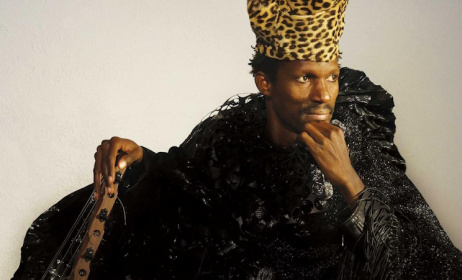Ziva Muntuuyo is proof that conscious rap is timeless
Seven years ago on 19 September, Sylvester Kabombo released his album Ziva Muntuuyo on CD, cementing his status as one of the most influential hip hop artists in Uganda. At that time, mainstream rap was on the rise but Kabombo went a different direction: he fused traditional music with hip hop. That, along with his bold perspective on social-economic issues in the country, made him stand out from his peers.
 Ziva Muntuuyo was first released on CD in 2014.
Ziva Muntuuyo was first released on CD in 2014.
On 9 July this year, Kabombo announced the digital release of Ziva Muntuuyo and fans were thrilled, proving that he is still one of the most valued artists from hip hop’s golden age, not least because the genre continues to inspire the new generation that brings its vibrant modern touch to the local scene.
“Having it online was purely out of public demand,” Kabombo says. “During the lockdown, I received requests from fans online and offline who wanted this particular album, and since I could not print physical copies, I was challenged to put it online. By the time the album came out, CDs had gone out of style, and people resorted to flash disks, audio downloads and streams.”
Although Kabombo may have grown up in a world different from the one we find ourselves in today, the problems encountered by Ugandans back then were not much different from the ones being experienced now. We now find ourselves living in a world where poverty, crime and intolerance remain as dominant as they were back then.
The album’s title track and the song ‘Twagalane’ urge people to love one another and question why so much hate exists in the world. These songs are a pertinent reminder that we should extend love to people of all races and religions. The former’s beat is a fusion of traditional music and hip hop. This production technique is also present in ‘Omulya Mamba’, the first fusion track he recorded in 2013. “The shakers, drums and percussion were all done using software because at the time it was costly to record live instrumentalists. But we were able to outsource Abraham Ssekasi to play the adungu and endingidi instruments”.
“These songs are a plea for tolerance, acceptance, and love for our fellow humans,” Kabombo says. “We need to practice coexistence. We should celebrate our diversity instead of using it as a means to spread hate.”
Kabombo also speaks against poverty, oppression, violence and injustice in ‘Bitabuse’ and ‘Baako Nekyokolawo’. These singles highlight socio-economic issues brought about by bad governance and political oppression. To achieve good governance and zero tolerance to corruption, Kabombo says the participation of young people is key. He often calls on young people on social media to disrupt the status quo with fresh ideas, reminding them of the critical role they have in shining a light on the country’s many challenges.
“Young people should be at the frontline of championing good governance,” Kabombo says. “African youth are passionate and creative, but they need more space to expose their innovativeness, provide solutions, and work and build an atmosphere that suits all and prepares the future generations to not face the same insecurities, imbalances and corruption we see today.
“In Uganda, we live in a predatory neo-colonial capitalist system. Things are getting worse. There can only be real change once we can get selfless leaders in all departments of government. We must also end the tendency of getting distracted by viral scandals meant to divert the public’s attention from real issues. The youth in Uganda are the majority. Therefore, they should be the architects of the future that they want to see.”
This album also features collaborations, notably on ‘Weyise Bulungi’, where Kabombo enlists the lyrical prowess of lugaflow queen and veteran emcee Lady Slyke. Kabombo says Lady Slyke is one of the emcees that stand out because of her lyricism. He adds that the days of artists coming out and providing something rare, fresh and innovative is hard to come by. However, there are rappers such as Byg Ben, Tushi Polo, Lil Rich, Tony M, Sandra UG and Ashman who display new flows and fresh lyrical content.
“Right now, a lot of music is contingent on what the next person is doing, and people emulate that,” he says. “The new artists should study the minds and the unique works of those who made music before them for hip hop in Uganda to cross borders.”
Stream Ziva Muntuuyo here.



























Commentaires
s'identifier or register to post comments